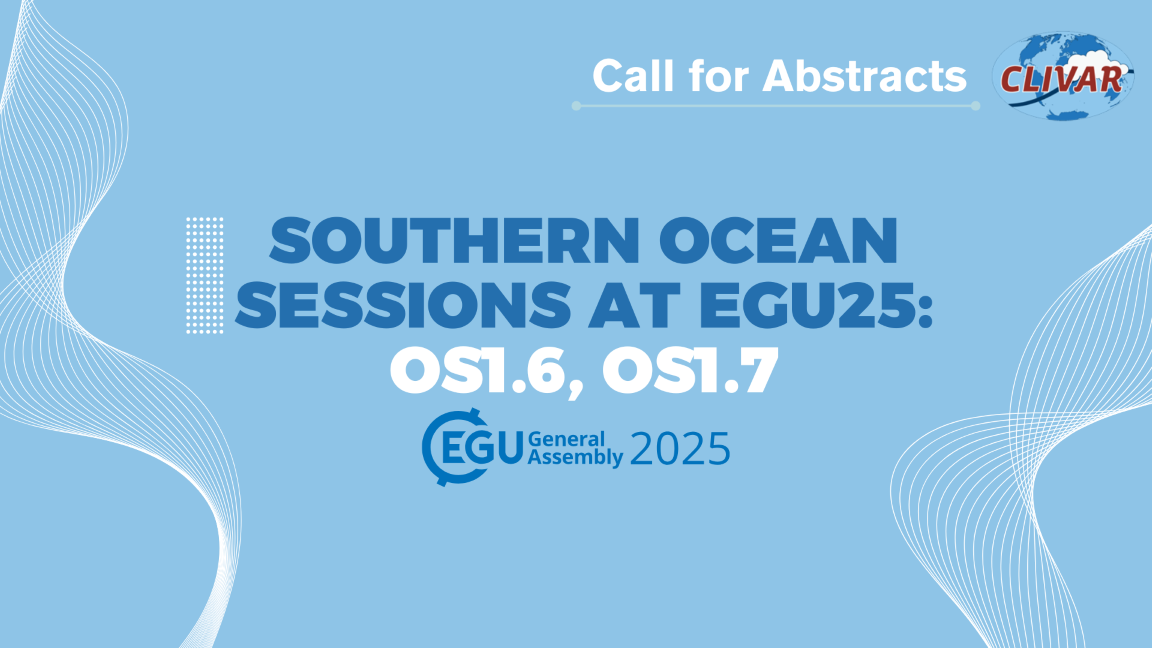[Call for abstracts] Southern Ocean Sessions at EGU25

We would like to draw your attention to submit abstracts to two upcoming Southern Ocean sessions convene by CLIVAR members at the
EGU General Assembly 2025 in Vienna, 27 April to 2 May 2025:
- OS1.6 The Southern Ocean in a changing climate: physical, biogeochemical, and ecosystem processes -Abstract submission
- OS1.7 Under cover: The Southern Ocean’s connection to sea ice and ice shelves -Abstract submission
The sessions will be run in a hybrid format that allows for both in-person and virtual oral and poster presentations. Please submit your
contributions by 15 January 2025, 13:00 CET. Applicants for financial support should submit their abstracts by 2 December 2024, 13:00 CET.
Details and updates can be found on the EGU25 website.
SESSION DETAILS:
OS1.6 The Southern Ocean in a changing climate: physical, biogeochemical, and ecosystem processes
Conveners: Alexander Haumann, Channing Prend, Cara Nissen, Anja Studer, Maurice Huguenin
The Southern Ocean is vital to our understanding of the climate system. It is a key region for vertical and lateral exchanges of heat, freshwater,
carbon, oxygen, and nutrients, with significant past and potential future global climate implications, especially around the latitudes of the Antarctic
Circumpolar Current, which is the focus region for this session. The role of the Southern Ocean as a dominant player in heat and biogeochemical
exchanges as well as its response to changing atmospheric forcing and increased Antarctic melting remains uncertain. Indeed, the sparsity of
observations of this system and its inherent sensitivity to small-scale physical processes, not fully represented in current Earth System Models, result
in large climate projection uncertainties and considerable discrepancies between observations and models. To address these knowledge gaps, the
Southern Ocean is currently subject to investigations with increasingly advanced observational platforms as well as theoretical, numerical and machine
learning techniques. These efforts are providing deeper insight into the three-dimensional patterns of Southern Ocean changes on sub-annual, multi-decadal
and millennial timescales, as well as their potential future modifications under a changing climate. In this session, we welcome contributions concerning
the role of the Southern Ocean in past, present, and future climates. These include (but are not limited to) small-scale physics and mixing, water mass
transformation, gyre-scale processes, nutrient and carbon cycling, ventilation, ocean productivity, climate-carbon feedbacks, and ocean-ice-atmosphere
interactions. We also welcome contributions on how changes in Southern Ocean circulation as well as heat and carbon transport affect lower latitudes
and global climate more generally.
OS1.7 Under cover: The Southern Ocean’s connection to sea ice and ice shelves
Conveners: Xylar Asay-Davis, Valentina Volkova, Maren Richter, Torge Martin
The interaction between the ocean and the cryosphere in the Southern Ocean has become a major focus in climate research. Antarctic climate change has
captured public attention, which has spawned a number of research questions, such as: Where and when will ocean-driven melting of ice shelves yield a tipping
point in the Antarctic climate? What drives the observed reduction in Antarctic Bottom Water production? How does the Antarctic Slope Current interact with the
continental shelf? What role do ice-related processes play in nutrient upwelling on the continental shelf and in triggering carbon export to deep waters? Are we seeing
a new state for Antarctic sea ice? If so, what ice shelf, sea-ice, ocean and atmospheric processes play roles in determining this new state?
Recent advances in observational technology, data coverage, and modeling provide scientists with a better understanding of the mechanisms involving ice-ocean interactions
in the far South. Processes on the Antarctic continental shelf have been identified as missing links between the cryosphere, the global atmosphere and the deep open ocean
that need to be captured in large-scale and global model simulations. This session calls for studies on physical and biogeochemical oceanography linked to ice shelves and
sea ice. This includes work on all scales, from local to basin-scale to circumpolar; as well as paleo, present-day and future applications. Studies based on in-situ observations,
remote sensing and regional to global models are welcome. We particularly invite cross-disciplinary topics involving glaciology, sea ice physics and biological oceanography.











Add new comment